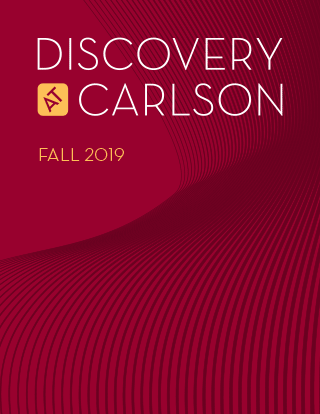
Professors Connie Wanberg and John Kammeyer-Mueller Extol the Benefits of Extraversion
Friday, November 15, 2019
The concept of introverts and extraverts has long been a fascination for researchers and the general public. In recent years, social media and its personality tests, as well as the bestselling book Quiet: The Power of Introverts in a World That Can’t Stop Talking, further piqued people’s interest.
Professor Connie Wanberg knew her students were interested, too. The students worried they might struggle in the work world and that extraverts would have an advantage. So Wanberg teamed with Professor John Kammeyer-Mueller to research that question and give the students some reassurance.
They couldn’t.
Using meta-analysis to analyze research
In the most extensive research of its kind, synthesizing more than 2,700 studies with more than 1.1 million participants, Wanberg and Kammeyer-Mueller found that the personality trait of extraversion is a persistent advantage in the workplace.
“It’s a small but reliable advantage,” Wanberg says. “It’s like someone getting a 5-foot head start in a 100-yard race. It’s small but it’s there.”
Contrary to popular belief, extraversion isn’t just about sociability and introversion isn’t just about wanting to be alone. The researchers found differences in motivation, enthusiasm and assertiveness and those can play out in the workplace.
Advantageous in every setting
“I assumed extraversion was advantageous in some work settings and a disadvantage in others and what we find is even if you’re in a place where you’d think introverts would thrive, being an extravert is still to your advantage,” Wanberg said.
Particular areas of advantage include performing better in job interviews, being more persistent in a job search, negotiating better, leadership emergence, and leadership effectiveness. Yet even with these results, there are still subtleties at work. For example, extraverts have an advantage in a less structured job interview; the advantage diminishes with an interview that is more standardized among applicants.
“Maybe companies need to do more structured interviews so the extravert advantage isn’t overstated,” Kammeyer-Mueller says. “It’s another case where the bias in interviews can be controlled.”
All is not lost for the introverts, however. They might consider their motivation levels and what helps them behave in a more extraverted way. If they learn that, they can structure their day around their extraverted times and know when they can recharge.
...what we find is even if you're in a place where you'd think introverts would thrive, being an extrovert is still to your advantage.
Behavior, situations matter more
The research also found that situations matter. In a workforce of extraverts, introverted managers outperformed extraverts.
“People who are introverted can be rated as good leaders, we can’t misinterpret this finding as saying that everybody who is an effective leader is an extravert,” Wanberg says. “It’s just that people who are extraverted tend to be rated higher as leaders.”
Kammeyer-Mueller readily admits he came into the research with his own bias: He considers himself an introvert, and hoped those pesky extraverts didn’t really have an advantage. It turns out they do.
“That’s the cool thing about doing research—the results turn out the way they turn out,” he says. “Data has a way of proving itself whether you want it to or not.”
Do Extraverts have an Advantage in the Workplace?
The concept of introverts and extraverts has long been a fascination for researchers and the general public. Carlson School of Management Professor Connie Wanberg knew her students were interested, too. The students worried they might struggle in the work world and that extraverts would have an advantage. So Wanberg teamed with Carlson School Professor John Kammeyer-Mueller to research that question.

